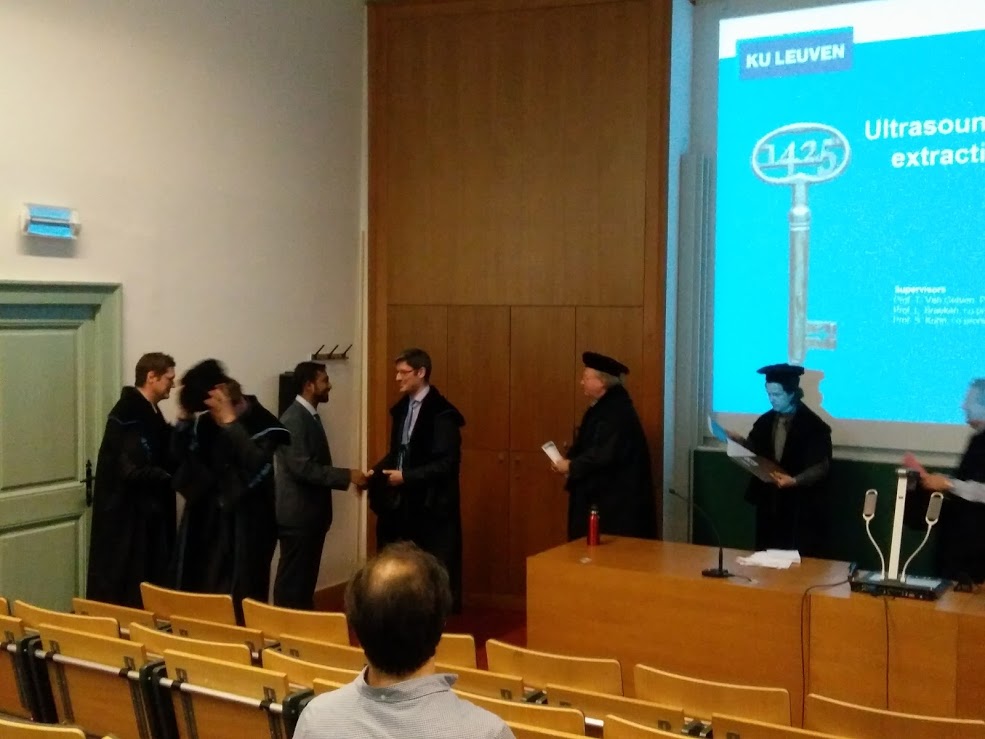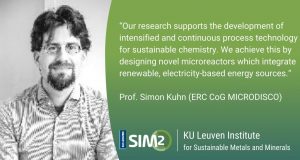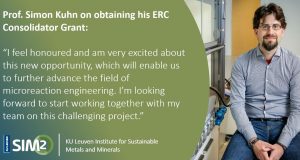On June 2nd, 2017 Jinu Joseph John (Department of Chemical Engineering) successfully defended and obtained his PhD degree at KU Leuven. The topic of Jinu Joseph John PhD dissertation was Ultrasound-Assisted Liquid-liquid Extraction in Microchannels.
Publications in the context of this PhD
- John, J.J., Kuhn, S., Braeken, L. , Van Gerven, T. (2016). Ultrasound assisted liquid–liquid extraction in microchannels—A direct contact method. Chemical Engineering and Processing: Process Intensification. 102, 37–46. doi:10.1016/j.cep.2016.01.003
- John, J.J., Kuhn, S., Braeken, L., Van Gerven, T. (2017). Ultrasound Assisted Liquid-Liquid Extraction with a novel Interval-Contact Reactor. Chemical Engineering and Processing: Process Intensification.113, 35–41doi:10.1016/j.cep.2016.09.008
- John, J.J., Kuhn, S., Braeken, L., Van Gerven, T. (2017). Effect of fluid properties on ultrasound assisted liquid-liquid extraction in a microchannel Ultrasonics Sonochemistry. (Submitted)
- John, J.J., Kuhn, S., Braeken, L., Van Gerven, T. (2017). Temperature controlled interval contact design for ultrasound assisted liquid-liquid extraction. Chemical Engineering Research and Design. (Submitted)
Patent
Patent No. GB 1603238.5 –Ultrasound solvent extractor – Filed.
Abstract
Microstructured devices are seen to be the future of chemical industry. They bring about process intensification by means of their characteristic small size which increases the surface to volume ratio, providing improved mass and heat transfer effects. The decrease in size can cause clogging and it is difficult to induce active mixing at these scales. Both problems can be solved when utilized in combination with ultrasound by means of acoustic cavitation. The current combination of these two technology make use of ultrasonic cleaning baths which are highly inefficient for the purpose. This research aims at an effective integration of ultrasound with microreactors, under conditions of reproducibility, good control of the ultrasound parameters and visibility of the process . The process of interest to us is liquid-liquid extraction, as it is a common unit operation in most chemical industries and also sonication of immiscible liquid-liquid systems may provide improved mass transfer effects as a result of emulsification.
To bring about a versatile and a modular design embodying the various conditions discussed the following strategy is used. First, three preliminary designs were constructed to study the effect of using a solid and liquid interface for the transfer of ultrasound to a microchannel. These designs were tested for the effect of the various operating and design parameters. The results obtained showed the best performance for the designs making use of the solid interface, but poor temperature control. The liquid interface designs had good temperature control but poor performance. Based on the findings the final design was constructed to combine the advantages of both the design types and then scaled for maximum throughout per plate. Finally, the usability of the design was evaluated by performing real case studies involving heterogeneous liquid-liquid systems from a API manufacturing process of Johnson & Johnson.





